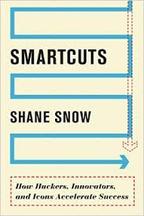 I really enjoyed Dan Ariely's last two books, so I decided to read his latest which just recently came out, Irrationally Yours: On Missing Socks, Pickup Lines, and Other Existential Puzzles. This one was a very short, fun read made up of Dan's answers to reader questions in his weekly Wall Street Journal column. It was a good mix of behavioral economics/psychology combined with a nice dose of his Jewish sense of humor. I most enjoyed his discussions of memory and deception as well as his suggestions to use more rules to curtail temptations and keep you disciplined. Intro Studying social behavior Escalation of commitments Art and joy of saying no When get request assume it is for next week. Would u cancel for it? If have to cancel another activity for it, would u? Cancel elation: would u feel happy if it got canceled? Netflix dissatisfaction Loss aversion Think of it as museum Dieting Present focus bias Hard to separate self into eater and noneater Avoid exposing self to bad foods Replace foods at home Religious rules to dieting Forgotten and forgiven loans Loaner to bring it up and clarify Marriage economics Social networks and norms Coffee People paying for the story Wedding ring Give gift u don't enjoy shopping for as signal Whistle blowing Variety as memory enhancement Break up week into series of separate experiences Benefits of crowded places for dates Misattribution of emotions Hiring good and free advisor What advice would give best friend in that situation Garlic placebos Specific requests More likely to help when request is specific Grandparents Saying sorry always helps Thinking ahead People think usually only 1 step ahead in game Gossip as social coordination mechanism To participate more fully in conversations Marriage changes ur view of ur own relationship and long term thinking Ruminating while running Joy of getting things done Hard to find joy when can't fully complete a big project at once Potential to make something new perfect increases motivation Pick projects that are self contained Multitasking Calling home Toasts and superstition Low cost to ritual vs big cost to not following Pickup lines Compliments make people happier Illusion of labor Think time is wasted when don't see progress Take joy from seeing someone work hard for us even if it takes longer Make clear to others how hard u work Misery of flying Think of marvel of flight Evidence of common humanity Flashy cars Signaling Dressing down Wearing clothes from different culture prevents PPl thinking ur too casual Exploring the unknown Loss aversion makes us not try something new Trying out relationships Carry out experiments in similar situation Spend 2 weeks with girlfriend's mother Divorce rate 2 good experiences: pleasures and comforts Give up comforts and seek pleasure Financial advisor Imagine paying them monthly from ur checking account Sharing food with squirrels Internet social activity Expectations and hiring Dating: knowing more about someone leads to less love CEOs hired from outside get paid more because don't know as much about them Learning better decisions Create good habits Delegate difficult decisions to rules and habits Power of expectations Don't over heighten expectations Don't exaggerate by too much; 10% ok Communicating safety Call mother at night Perfect gift Increase likelihood gift is used Swap in gift for old ones so it's used Eating lessons and kids Maximizer should eat better food first Avoiding minimum type should first eat worse food then better one after Useful complaining Think of reason someone is complaining and make most of it Prices and bidding frenzy Auctions: starting perspective vs competition Initial asking price affects expectations Stress and caring for old Luck as multiple stage number game Luckier people try things more often In life decisions are not binary and involve multiple stages Life is a numbers game Cut options that aren't working Socks and supernatural Overcounting of missing socks Involves how our memory works Tithing Giving money away leads to happiness Have specific rules Midlife cliche Websites creating alibis Increase dishonesty Breakfast regrets Counterfactuals Comparing what could've been in imagined world When don't imagine world then feel better Night time activities Problem of coordination Suboptimal default option Sequential coordination instead Draw random activity per night Playing parents Move in for week with friends who have kids Take care of kids of different age groups Joint accounts Wine ordering Set limit on spending Traffic jam altruism Issues of control and credit/gratitude Idle waiting Annoying irrationally to ppl Forcing decisions with coins Opportunity cost of time Spinning coin forces us to decide which one we really want Trashing norms Changing social norms Relentlessly critique violators Create new social norm Smoking Effects cumulative and delayed Adventures and investments Life is about learning and improving where can become a different and better person Retirement Correcting mistakes Honesty on vacation Paying food bill Better for one person to pay and alternate to increase good feelings of free meal Exercise time Procrastination Memory Fewer new experiences as age More routine Audiobooks Pascal wager Showing off price Accumulating pleasure and pain How to combine experiences Extreme vs average approach Pay attention to joyful part of each experience Lack of self control Depletion after full day Ability to resist urges depletes like muscle Odysseus with sirens tied to mast with strict rule Keep tempting food out of house Balancing and rule of three Sweet spot Wasting time deciding Limit time spent deciding group activity Set up default activity if can't decide Buffet ROI Asking right questions Ask the stupid questions Donuts and locus of free will We can design our environment to help overcome our weaknesses Most optimistic day New year resolutions wishful thinking Investing Hot cold empathy gap Set up rules that prevent emotional decisions Don't look at portfolio often Limit our ability to make decisions Commuting and adaptation Uncertainty makes adapting to traffic difficult Travel prices Different emotional states when making decision vs having experience Promotions Joy from developing in career Invention of titles Gamification for employees Identifiable victim effect Care more when see the victim vs when have psychological distance Other job switching Volunteer at other company for a while to see if like it during vacation Moving or not Endowment effect of current situation as reference point Status quo bias: staying in same place is actually a decision Frame move as 6 month trial Bad academics Hard to communicate Curse of knowledge Bad romance Fun and self control Shrinking and self deception High heel attractiveness Rules to overcome negative signals Taxes and mitzvahs Think of how much u made instead How much giving to others Duty and privilege Reframing Service word Loss aversion and sports Bad at predicting emotional response to losses Enjoying process more important than final outcome
0 Comments
 I just finished reading Guns, Germs, and Steel: The Fates of Human Societies by Jared M. Diamond, and I must admit it was quite a slog. The book is long, detailed, and not too entertaining. It was recommended by Charles Munger in his Almanack, and I had heard about it many times before. The book's core question is indeed an interesting one: Why did some countries and societies develop so much more than others, conquering others and creating better life for their people? Is it due to racial differences or something else? The book is #1 on Amazon in the category of "geography," and I think that was part of the slog of reading it; the extremely detailed info on the history, environment, and topography of all the different parts of the Earth was just less compelling to read as so many of the sub-points and background were not well connected to the main question in the book. The most interesting parts for me were the beginning and the end, which basically answer the question by saying that the differing environments and natural resources of the continents as well as the different societal organizational structures contributed to different levels of diffusion, migration, and technology development that allowed some societies to prosper more than others. I did enjoy the discussion of how languages built on top of one another and how writing systems played a big role in societal development. It was obvious to me from the start how guns and steel would be useful for societies, but all the stuff about germs, food production, and animal domestication was a lot less obvious to from the start and was interesting to learn (though way too detailed and at times off topic for my taste). Below are some of my notes and takeaways from the different chapters. If you really love history and geography as well as archaeology or the science of researching the past, this book is a good one for you. If not, I wouldn't recommend it. Prologue Differences between lifestyles in societies Why did wealth and power become distributed as they are now? Different rates of development Europeans ended up with guns, the worst germs, and steel tools Diversity in New Guinea; 6,000 human languages and 1,000 of them in New Guinea Part 1 1 head start New Guinea would've seemed to have gotten head start 2 a natural experiment Polynesian history provides good test of development 3 collision Guns Ability to write Part 2 the rise of food production 4 farmer power Prerequisite for production of guns, germs, and steel Horses Manure 5 haves and have nots Different resources and starting habits 6 to farm or not to farm 7 how to make an almond Crop development Plants adapt to animals that eat them 8 apples or Indians Fertile Crescent had better variety of plants and environment 9 domesticable animals Need many factors like diet and character to work out for an animal to be domesticated for food production and hunting 10 spacious skies and tilted axes Axis orientations of continents affected food production and resources Part 3 from food to guns germs and steel 11 lethal gift of livestock Germs from animals and people 12 blueprints and borrowed letters Writing transmits knowledge Borrowing writing systems 13 necessity mother 14 egalitarianism to kleptocracy Religion supports politicians Food production makes complex societies possible Part 4 around the world Ch 15 Australia and New Guinea Less cultural change 16 how china became Chinese 17 Polynesia Outrigger canoe allowed travel over waves 18 hemispheres colliding European discovery of America Food production tech and tools allowed Europeans to sail Big domesticated animals in europe More germs in europe from crowded living created immunities Metal tool use much more in europe Sailing vessels More use of writing in europe Organization into states in europe 19 how Africa became black Huge diversity Language families show origins of people and their travel around world Epilogue Differences in societies due to differing environments Diffusion and migration  Based on Noah Kagan's recommendation on his interview with Tim Ferriss, I just finished reading Smartcuts: How Hackers, Innovators, and Icons Accelerate Success by Shane Snow. The book was a fun, quick tour of various techniques used by unconventional "hackers" who achieved success much more quickly than traditionally thought possible. I liked the beginning of the book more than the end, which seemed too light on new ideas and content. My favorite part of the book was the story of the perseverance of Jimmy Fallon. Intro Smart shortcuts to doing stuff way faster Lateral thinking Not following rules Smartcuts not just shortcuts which can be amoral Smartcuts are shortcuts with integrity Short Leverage Soar Part 1 short 1 hacking the ladder Presidents younger than senators BYU scavenger hunt game bigger or better Psychology of small wins Just keep the game going Pivoting accelerates growth Ladder switching in career Use credibility to switch ladders to bypass dues 2 training with masters Jimmy Fallon Justin bieber had the best mentors who brought him up Doctors learning patient handover from racing pit crews Formal mentorship bad idea; informal personal relationships better Learn and copy from masters yourself from books and videos of masters Learn attention to detail Study videos of masters obsessively and memorize facts and details of them 3 rapid feedback Startup funeral: Funerals for startups to share what learned when failed Past failure does not help with future ones according to studies But succeeding makes you more likely to succeed Failures caused more of own failures Seeing others fail makes u do better Doing well makes u do better Failure paradox, attribution theory of failures to external things but success to internal things When others fail we attribute failure to others but when others succeed we attribute success to luck Separate ego when you get feedback Rapid scientific experiments Part 2 leverage 4 platforms: the laziest programmer Abstraction Selective slacking Ruby on Rails Teaching kids how to learn instead of what to learn and memorize 5 waves Waiting for the right wave Pattern recognition Fast follower 6 superconnectors Giving Part 3 soar 7 momentum Progress makes u happy Big success needs u to continue progress even after big winning Just keep moving Build up potential energy so can leverage it when u get big break 8 simplicity Innovation is about doing something different or simpler not just bigger Simplify decisions to avoid unnecessary ones 9 10X thinking Elon musk Epilogue |
Archives
June 2024
Categories
All
Subscribe |
 RSS Feed
RSS Feed
